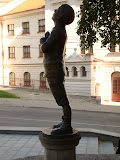The French writer and diplomat
Romain Gary
(Vilnius 1914 - Paris 1980)
Lived from 1917 to 1923 in this house
That he mentions in his novel
"La Promesse de L'aube" (The Promise of Dawn)
Romain Gary was raised by his mother, a strong and eccentric lady with the singular objective to leave Lithuania with her son and move to France. And by eccentric I mean the type that would have no problems dressing up her boy in tattered clothes and putting on a grand act just to sway the situation her way. She started off as an actress, then became a tailor of some sort and later did odd jobs just to put food on the table. However difficult the situation she always prepared three meals a day for Romain, even at her dietary expense. The book "La Promess de L'aube" gave me the impression of her as a mother who, even as she pushed forward to paving a better future, made it a rule to everyday spend time with her son. Among other things, she taught him how to speak French, drilled him in the mannerisms of aristocrats and encouraged in him the wiles of a dandy - a real man, to her, is one who can wrap a lady tight around his finger. She took for granted that her son would have a bright future. This was not a matter of clairvoyancy, but justice: for, in her mind, something had to pay off after such a difficult life. In dramatic gestures and in a booming voice that only a stage actor can muster she would tell the child Romain how, in the future, he would serve honourably in the French army, become a respected diplomat and a great artist.
And so he did - just as his mother said. Romain Gary served in the Free French Air Force during WWII, then became a diplomat and a famous writer. Romain even dressed in the 'English' style, as his mother fancied. As a writer, among his long list of achievements is to have written the screenplay for the 1962 American WWII film The Longest Day and to have won the Goncourt - the prestigious literary prize in France - twice. Authors can only win this award once. But Romain Gary, after winning the prize, completely changed his writing style and wrote under the pseudonym Emile Ajar to win the prize again! Only from a posthumous letter did it become known that Emile Ajar and Romain Gary are one and the same.
His mother didn't live to see his success - she died only a few years before Romain returned with his fellow soldiers to a liberated France. And he only found out of her passing when he returned home, all clad in his military uniform. Years later, after a long and successful career, Romain Gary found it difficult to accept the weakness and degradation of his body brought on by age. I imagine he was haunted by the void of a strong female presence in his life, of memories from the war or of all the emotional loss he suffered from the currents of time. He drifted in and out of depression for a long time until, at 66 years of age, he took his own life by gunshot.
A friend of mine introduced me to Romain Gary a few years ago. It dawns on me that I would never have met my friend and, therefore, not have known of this author if I hadn't lived a part of my life in France. Today I'm in Vilnius, Lithuania, standing in front of the house Romain Gary lived in. Down the road, on the street corner, is a small statue of the author as a boy. The statue shows him looking up at the sky and holding a shoe close to his chest, capturing a scene from his childhood when he ate one of his shoes to impress a girl he fancied. I, too, like to remember Romain that way.



No comments:
Post a Comment